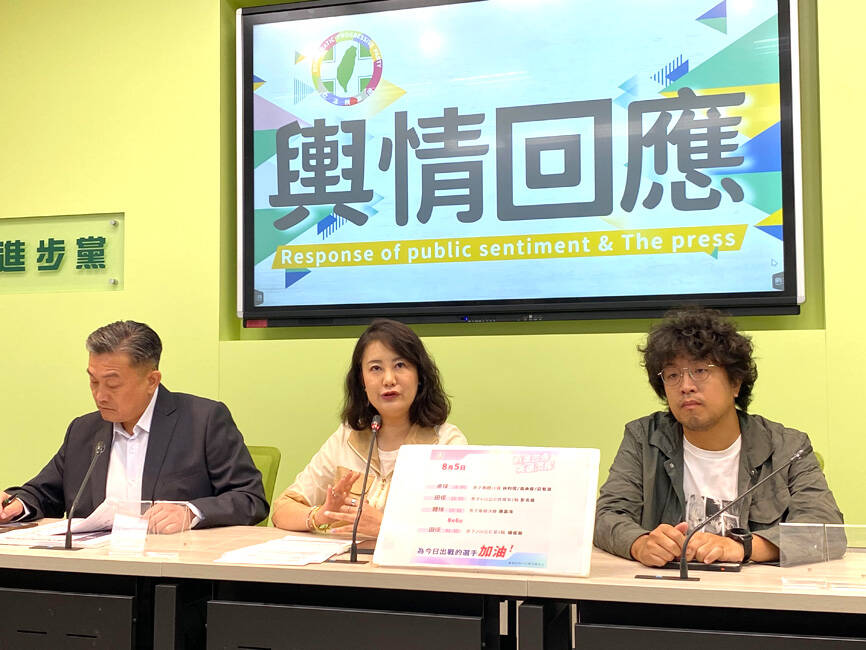The Democratic Progressive Party (DPP) caucus yesterday slammed former president Ma Ying-jeou’s (馬英九) comments that the government was squandering money on national defense, saying he has embarrassed himself by ignoring China’s rapidly expanding armed forces and military threat against Taiwan.
During a speech on Sunday at an event in Bangkok, Ma said the government had taken on a heavy burden by allocating large sums of money for military expenditure, notably to buy US-made weapons, as payment for “protection,” as former US president Donald Trump has said.
“Money-pit bills” to buy arms would ruin public finances and only benefit the US defense industry, he said.

Photo: Hsieh Chun-lin, Taipei Times
At a news conference in Taipei yesterday, DPP caucus secretary-general Rosalia Wu (吳思瑤) said that “portions of the government’s fiscal budget are for military spending to protect our country.”
“We actively engage in arms procurement from other countries to bolster our national defense, as well as to support indigenous weapons production,” she said.
“So what is wrong with building up national defense to safeguard our own country? Many countries around the world have higher military budgets than Taiwan? Are all their defense expenditures ‘money pits’?” she asked.
Ma has embarrassed himself on the world stage by calling military spending as squandering money, DPP Legislator Wang Ting-yu (王定宇) said.
“During Ma’s eight years as president, the government budget for national defense totaled more than NT$300 billion [US$9.19 billion at the current exchange rate]. It was not much, but he did allocate a budget,” Wang said.
China in March approved a national defense budget of more than 1.665 trillion yuan (US$234.35 billion), a 7.2 percent increase from last year, Wang added.
“We are the one under hostile intimidation by China, but Ma says Taiwan spending on the military is squandering money. Ma chooses to grovel and kowtow to China, while Beijing expands its budget to escalate its military threat against Taiwan,” he said.
Taiwan People’s Party Legislator Lin Yi-chun (林憶君) yesterday also criticized Ma’s comments.
“Allocating a budget for national defense depends on the military threat against Taiwan, and the amount should be adjusted as needed,” she said.
Taiwan faces more intense hostility from China compared with when Ma was in office, she said.
“Taiwan must invest in national defense, which has nothing to do with Trump’s talk about ‘paying for protection,’ nor Ma’s talk of ‘money-pit bills.’ It is necessary to allocate a budget to build up a more effective deterrent against hostile military threats from abroad,” she said.
The government must carefully plan the national defense budget to enhance Taiwan’s deterrence, while engaging in dialogue with China to reduce hostilities. This is the best way for Taiwan to achieve long-term peace and security,” Lin said.
Additional reporting by Lin Che-yuan

Taiwanese can file complaints with the Tourism Administration to report travel agencies if their activities caused termination of a person’s citizenship, Mainland Affairs Council Minister Chiu Chui-cheng (邱垂正) said yesterday, after a podcaster highlighted a case in which a person’s citizenship was canceled for receiving a single-use Chinese passport to enter Russia. The council is aware of incidents in which people who signed up through Chinese travel agencies for tours of Russia were told they could obtain Russian visas and fast-track border clearance, Chiu told reporters on the sidelines of an event in Taipei. However, the travel agencies actually applied

New measures aimed at making Taiwan more attractive to foreign professionals came into effect this month, the National Development Council said yesterday. Among the changes, international students at Taiwanese universities would be able to work in Taiwan without a work permit in the two years after they graduate, explainer materials provided by the council said. In addition, foreign nationals who graduated from one of the world’s top 200 universities within the past five years can also apply for a two-year open work permit. Previously, those graduates would have needed to apply for a work permit using point-based criteria or have a Taiwanese company

The Shilin District Prosecutors’ Office yesterday indicted two Taiwanese and issued a wanted notice for Pete Liu (劉作虎), founder of Shenzhen-based smartphone manufacturer OnePlus Technology Co (萬普拉斯科技), for allegedly contravening the Act Governing Relations Between the People of the Taiwan Area and the Mainland Area (臺灣地區與大陸地區人民關係條例) by poaching 70 engineers in Taiwan. Liu allegedly traveled to Taiwan at the end of 2014 and met with a Taiwanese man surnamed Lin (林) to discuss establishing a mobile software research and development (R&D) team in Taiwan, prosecutors said. Without approval from the government, Lin, following Liu’s instructions, recruited more than 70 software

Chinese spouse and influencer Guan Guan’s (關關) residency permit has been revoked for repeatedly posting pro-China videos that threaten national security, the National Immigration Agency confirmed today. Guan Guan has said many controversial statements in her videos posted to Douyin (抖音), including “the red flag will soon be painted all over Taiwan” and “Taiwan is an inseparable part of China,” and expressing hope for expedited reunification. The agency last year received multiple reports alleging that Guan Guan had advocated for armed reunification. After verifying the reports, the agency last month issued a notice requiring her to appear and explain her actions. Guan